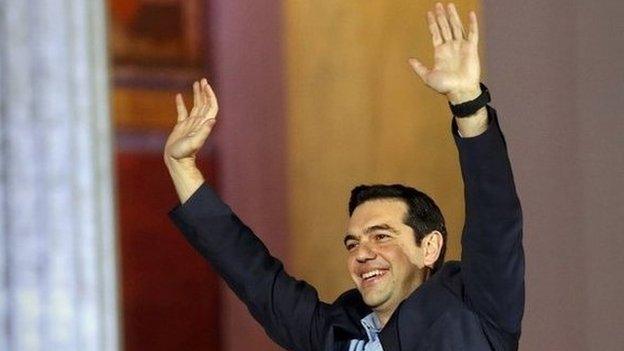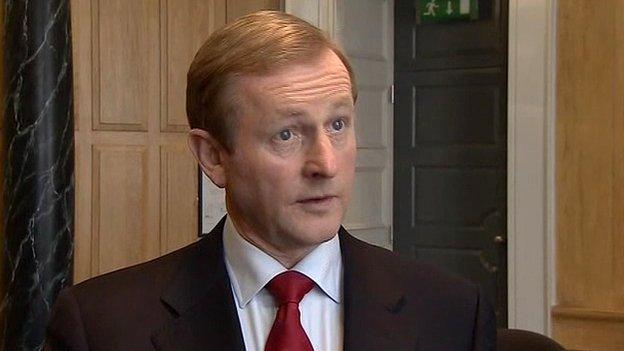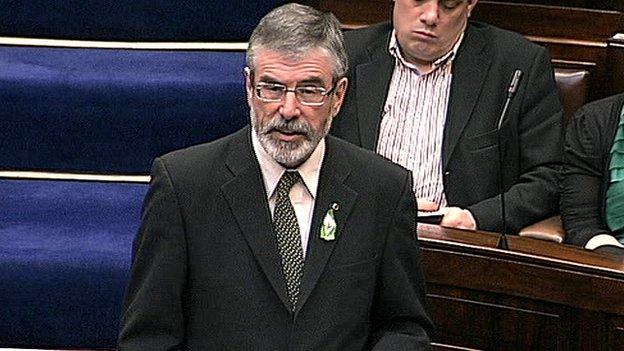Greece debt crisis to have political impact in Ireland
- Published
- comments

Sinn Féin has close links to Greek ruling party Syriza, led by Alexis Tsipras
Back in January, I noted Sinn Féin's close links with Greece's Syriza concluding that "the next couple of years should establish whether Syriza's policies represent a new radical way forward for Europe's debtor nations or lead Greece into even more dire financial straits.
"Whatever happens in Greece, good or bad, is certain to inform the debate back in both Dublin and Belfast."
Events have moved more rapidly, with Greece now on the brink of a referendum on the terms of its bailout, and politicians in Dublin and Belfast drawing their own parallels.
In a Belfast Telegraph article, external, Secretary of State Theresa Villiers didn't mention Greece by name, but warned Stormont parties against going "down a path of reckless irresponsibility that leads to the kind of politics now playing out in parts of Europe".
In the Dail (Irish parliament), Sinn Féin leader Gerry Adams has been using the plight of the Greeks to target Enda Kenny, external, accusing the taoiseach of "kowtowing" to a right-wing ideology and behaving "shamefully, uncritical and subservient to Brussels".
The Sinn Féin argument is that Dublin doesn't want Athens to achieve a write-down of its debts, because this would expose the Irish government's timidity in not demanding the same.
Fine Gael isn't slow to respond. Mr Kenny told Mr Adams he profoundly disagreed with his comments.
Noting that Syriza sent an observer to Sinn Féin's latest ard fheis (conference), Mr Kenny argued this indicated "where Sinn Féin is headed in respect of delivering for Ireland" continuing that he "would not expect the citizens of this country would have anything to do with a situation such as that which, unfortunately, obtains in Greece".

Taoiseach Enda Kenny has said the people of Ireland would not want to have anything to do with a situation such as that in Greece
The Fine Gael and Sinn Féin leaders traded accusations of "rank hypocrisy" over each other's handling of the Greek negotiations and the Stormont House Agreement.
The exchange may not have been up the standards of Ancient Greek rhetoric, but it was fairly feisty. However, looking ahead could the way events play out in Greece have practical, not just rhetorical, repercussions?
In a recent An Phoblacht column, Sinn Féin's Declan Kearney described the notion his party wants to collapse Stormont because of the impending Dail election as "preposterous and absolutely untrue - and both governments know that to be the case."
Nevertheless other Stormont parties believe Sinn Féin is weighing its decisions north of the Irish border in the light of its hopes for further expansion in the south.
The Irish election is due to take place by April next year, and it's hard to foresee a fundamental shift in Sinn Féin's anti-austerity approach before the poll takes place.
But with no fixed term parliament act in Dublin, Enda Kenny can call the election at a time of his own choosing.
Fine Gael will weigh a number of factors in the balance, including the state of the Irish economy, the likelihood of an autumn Irish budget changing the political mood and the poor standing of their junior coalition partner, Labour, in the opinion polls.
With Sinn Fein's policies so associated with Syriza, it's also logical Fine Gael strategists will be keeping a keen eye on Athens. Could the Greek experience be another factor in determining the date of the Irish election?
If so, then it could have a direct consequence on any future efforts to resolve the deadlock at Stormont.

Sinn Féin leader Gerry Adams accused Mr Kenny of "kowtowing" to a right-wing ideology.